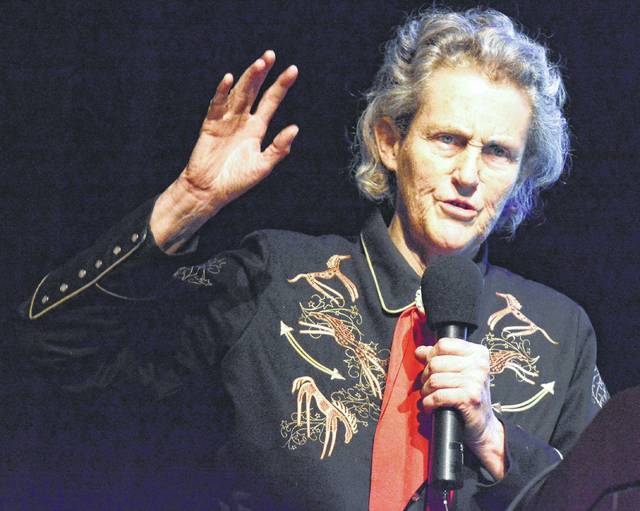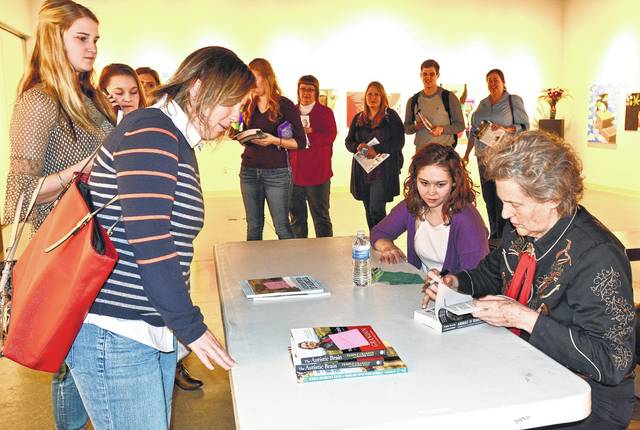

WILMINGTON — For farm animals as with people, first impressions are important.
That was one of many principles Dr. Temple Grandin pointed to in her talks Thursday at Wilmington College. A professor of animal science at Colorado State University, she is an author and advocate for farm animal welfare and persons afflicted with autism.
Whether it’s a horse, a cow or any livestock animal, their first experience to something new such as the farmer, a horse trailer or a new piece of equipment needs to be a good first experience, said Grandin. A lot of research backs that up, she said.
Grandin has designed livestock handling facilities on four continents, while meat plants handling much of the cattle in North America utilize the center track restrainer system she designed. In that connection, she acknowledged Thursday that in the early years of her career, she tried fixing livestock facilities solely through “a total engineering approach.”
“What I found is that facility is only half of the problem. The other half is management,” she told the audience that filled Hugh G. Heiland Theatre.
“You can’t fix everything with equipment,” continued Grandin, suggesting that the same holds true when changing or building new school facilities but not addressing other factors in learning.
Well-known for inventing more humane methods to improve the handling of animals at meat plants and elsewhere, she often uses facility design in order to use the animal’s own behavior impulses to control them, rather than by use of force, she said.
She said that can be a hard concept to get through the head of some livestock handlers.
She also said to keep in mind that animals are sensory-based, not word-based.
Switching to genetic selection in livestock, Grandin said if breeders over-select for any trait, “you will wreck your animal, period.”
She wants to make sure the beef industry does not repeat the mistake she said the pork industry made in the late 1980s and early 1990s when they selected meat traits only.
“I’m getting very concerned about leg conformation [leg structure] in beef cattle,” said Grandin in that regard.
She commented about agricultural policymakers during a question-and-answer period after her speech. One of the big problems for agriculture today, she said, is policymakers are “far away” from the agricultural operations.
“I think policymakers need to get out of the office. We got to drag these suits out of the office,” Grandin said.
When it comes to regulations, she said, “I’d rather have fewer regulations but [have] the important ones really strongly enforced and directly observable things.”
Grandin was diagnosed with autism at the age of 2. An audience member asked about the relations between children with autism and animals.
The animal science professor said she has found for the most part children with autism fall into three categories regarding animals.
Some just absolutely love animals, such as when an autistic child’s first words are uttered sitting on a horse. A second category is children with autism who at first are anxious around animals, but later warm up and like them. And a third group of autistic children do not like animals, she said.
Grandin thinks the cause of the third group’s dislike is sensory, with the child afraid the horse might whinny or the dog might bark and hurt their ears, or alternatively the child doesn’t like the smell of the animal. So for children in the third category, being around animals will not be helpful, she said.
But for her autism, animals were helpful.
“When I was in high school, I got bullied and teased all the time. The only place I was not bullied and teased was horseback riding and electronics class, model rockets class,” she said.
It’s important to get children who are “kind of different involved in an activity with peers where there is a shared interest,” remarked Grandin.
She said she had friends who would work together with her to get horses ready to show.
“That was a very important thing for me when in high school,” said Grandin.
Reach Gary Huffenberger at 937-556-5768.



